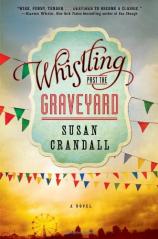Whistling Past the Graveyard
Review
Whistling Past the Graveyard
“When I opened my eyes, the window I saw wasn’t home. Things started to get untangled in my head, one kinky string at a time. I’d run away from home.”
Starla Claudelle is nine, and the year is 1963. She is heading for Nashville to find Lulu, the mother she hasn’t seen since she was a toddler. She has fled from Mamie, her strict, censorious grandmother. Her father is working on an oil rig, and though he sends money for her upkeep, he can’t visit often. So Starla would be on her own but for Eula, a kindly black woman who befriends her. Eula, however, has her own problems. She has stolen a white baby, and her man is violent and crazy.
"WHISTLING PAST THE GRAVEYARD is a multi-layered saga that can be enjoyed by teens and adults alike. It has a cinematic quality that will make readers wish for a screen version. And you can’t say better than that."
Starla, who tells this story, is relaxed and comfortable with Eula and baby James. But even she can sense that there are a lot of things wrong with the situation in which she has landed herself. Not knowing that Nashville is hundreds of miles away, or understanding that whites and blacks don’t “mix,” she, Eula and the baby keep moving. What she will find in Nashville, and on her journey back home, will permanently change her view of love and friendship.
Award-winning novelist Susan Crandall has crafted an adventurous ramble with an engaging set of mismatched characters. These are people who don’t belong together in the pre-Civil Rights South, so the events take on an undertone of tension that Starla intuits but cannot immediately grasp. As the picture of color barriers and racial hatred gradually emerges, she says, “…All of a sudden the whiteness of my skin made me too ashamed.”
The book is written entirely from Starla’s viewpoint, so her naiveté and childlike determination to make things turn out right for everyone, especially for Eula, without whom she never would have reached her goal, are ever present. The grownups and their perceptions are shown as Starla observes them: the menace of the white men who intend to rape Eula; the local cop who finds it in his heart to overlook the issue of color for Eula and Starla’s sake; her father, who learns about Mamie’s meanness, which he had never suspected, by listening to his daughter.
There is a soft, but not overdone, Southern accent that runs through the narrative, with some grammatical mistakes and humorous misinterpretations (“assault with batteries”) that help us remember that this is a child’s story through and through. Once the tale winds down, we breathe a sigh of relief, assured that Starla “wasn’t gonna run away again, no matter how bad things got.”
WHISTLING PAST THE GRAVEYARD is a multi-layered saga that can be enjoyed by teens and adults alike. It has a cinematic quality that will make readers wish for a screen version. And you can’t say better than that.
Reviewed by Barbara Bamberger Scott on February 5, 2014
Whistling Past the Graveyard
- Publication Date: July 2, 2013
- Genres: Fiction, Historical Fiction
- Hardcover: 320 pages
- Publisher: Gallery Books
- ISBN-10: 1476707723
- ISBN-13: 9781476707723





